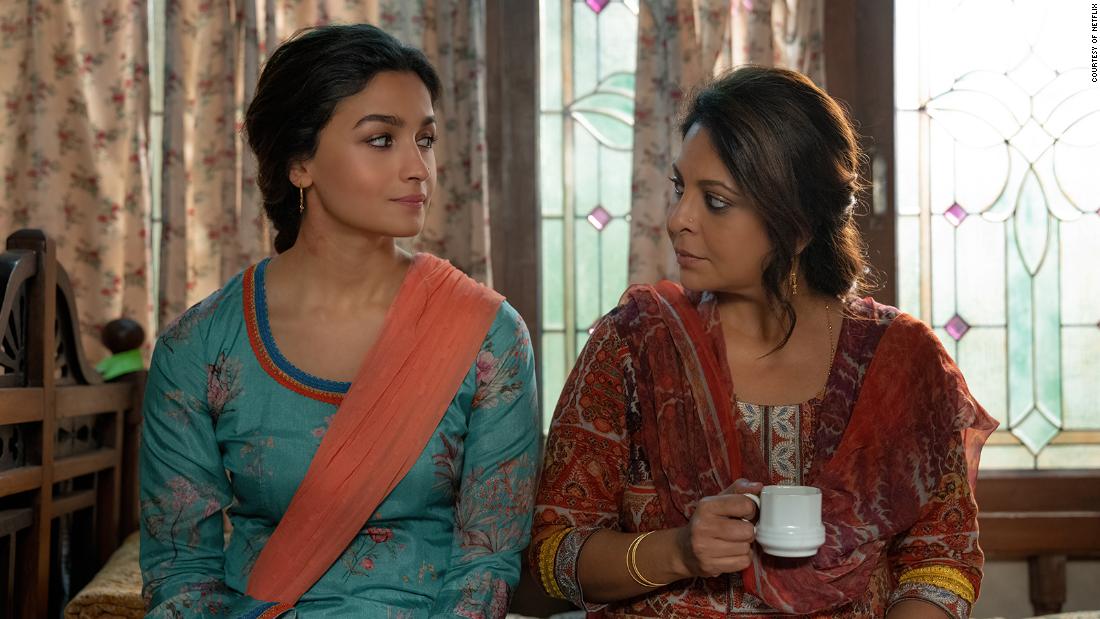
It’s one of several drastic ideas the protagonists consider as they confront an abusive relationship and attempt, albeit clumsily, to find a resolution. But for all the comedy in the movie’s twisting plot, the topic it addresses is a profoundly serious one.
For Bhatt, who also served as the film’s co-producer, “Darlings” offered a chance to tackle the issue of domestic violence head on.
“I need to prove a point, as a producer, that I’m not just producing a film for the heck of it,” she told CNN in a video interview from Mumbai. “I have not picked this subject because I could. I wanted to. I chose it and I wanted to tell this story.”
The 29-year-old has also worked alongside some of India’s top female directors in recent years, including Meghna Gulzar and Zoya Akhtar. And with “Darlings” marking a debut for Bhatt’s new production house, Eternal Sunshine Productions, the actor hopes to use her behind-the-scenes role to encourage greater representation in Bollywood.
“I feel — slowly, slowly — from being a very male-dominated room, I (now) see the balance. I see a lot of women,” she said. “And that’s happened over the last 10 years. I’ve seen the change — and it’s getting to a very juicy, exciting time.”
“Darlings” is, in essence, a mother-daughter tale about two women, Badru and Shamshu (played by Bhatt and Shefali Shah, respectively), grappling with abuse. It is a story told largely by women, with first-time director Jasmeet K. Reen also co-writing the script.

A promotional still from “Darlings” shows Alia Bhatt (left) with her co-stars Shefali Shah (center) and Vijay Varma (right). Credit: Courtesy of Netflix
The movie, which has been well-received by critics in India, broaches the topic of domestic abuse with considerable care. Reen consciously refrained from showing violence in the film’s early scenes, symbolizing how repeated abuse had become normalized to the point of invisibility.
“I didn’t want to sensationalize it,” she told CNN.
As the violent nature of Badru’s marriage comes to light, so too does the mother-and-daughter pair’s urgency to confront and remove themselves from the abuse. Reen said the lead characters were informed by her own proximity to domestic violence, recounting an instance when her aunt called her to ask whether her husband had ever hit her. The director, who was at first appalled by the question, realized it was neither her marriage nor her aunt that was the problem — but rather a culture where violence is prevalent enough for the question to arise in the first place.
“You grew up with it, so you empathize more (and) you understand (it) more,” she said. “And maybe that helps you build stronger, non-stereotypical (female) characters.”
Telling her story against this backdrop, Reen was mindful not to trivialize the subject matter. “It’s not a normal Bollywood film,” she said. “I tried to play with structure, I tried to play with genre — to say something and be sensitive towards it.”
They told CNN jointly over email that, to date, Bollywood’s approach to domestic violence can be divided into two strands: one where violence against women is normalized and another that demonstrates “both the violence women experience and their impulse towards resistance.” The authors cited Alia Bhatt’s 2014 movie “Highway,” in which her character confronts and publicly outs her abuser, as an example of the latter.
“Bollywood, like most industries in India, is male-dominated and that largely determines who gets represented and how,” said Anwer and Arora, a clinical associate professor at Purdue University’s Honors College and a professor of English and communication and women’s and gender studies at the University of Massachusetts, Dartmouth, respectively. “This is all determined by a structural inequity that is gendered in nature.”

Alia Bhatt pictured promoting her recent movie “Gangubai Kathiawadi” during the 72nd Berlinale International Film Festival Berlin in Germany. Credit: Stephane Cardinale/Corbis/Getty Images/FILE
Female-led productions like “Darlings” are, however, increasingly common in Bollywood — and they are changing how women participate in storytelling, said Bhatt, who was also involved in pre-production and script revisions. Reen commended Netflix for encouraging her to tell this story, saying she hopes “other filmmakers will be encouraged to write more stuff like this.”
Both women also credited their own mothers as sources of inspiration and support.
“I come from a middle-class family, but my mother was supportive of my dreams,” Reen said.
“I don’t maybe speak about it enough or too often. But (she’s) made a very, very important mark on my life.” Bhatt explained. “My mother is such a huge inspiration for me.”

